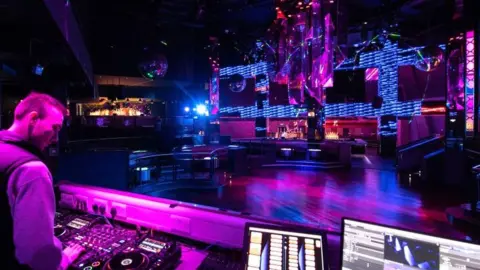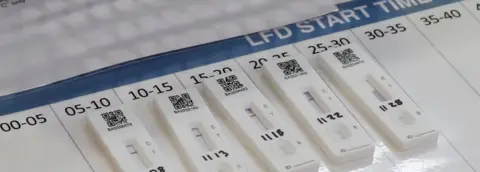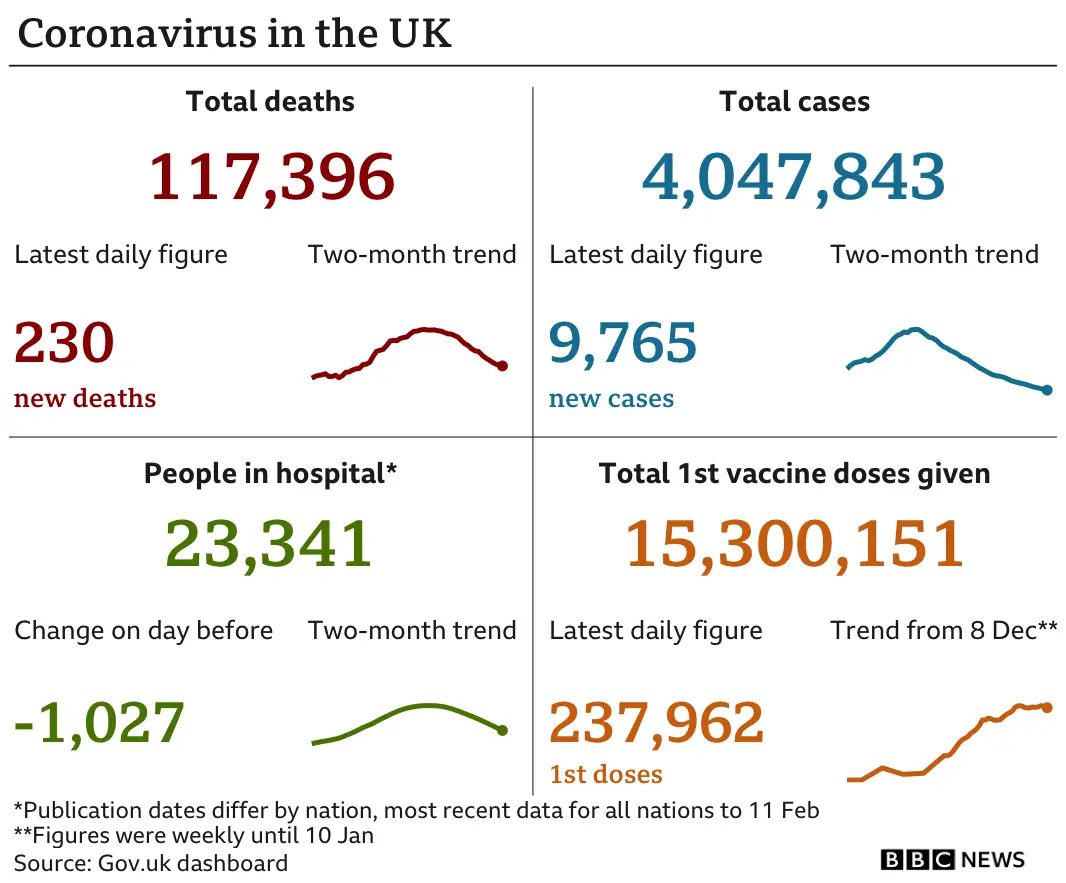Covid: Rapid tests could help reopen nightclubs, PM suggests
 Getty Images
Getty ImagesQuick coronavirus testing could enable nightclubs and theatres to reopen, Boris Johnson has suggested.
The PM said "rapid" lateral flow tests could be used by "those parts of the economy we couldn't get open last year".
"That, in combination with vaccination, will probably be the route forward," he told a Downing Street news conference.
But he stressed it was "still early days", with "lots of discussions still to be had".
A government source said: "There is a long way to go before we can get people back at big events safely."
Nightclubs have been unable to operate since the first Covid lockdown in March 2020, while many theatres have struggled to make social distancing work.
It comes as Mr Johnson said people must be "optimistic but patient" about an end to coronavirus restrictions in England.
He said steps taken to ease lockdown should be "cautious but irreversible" ahead of next week's release of a roadmap for lifting curbs.
Vaccines minister Nadhim Zahawi said that the government favoured testing over vaccine passports as a means to reopen the economy, since it is not yet clear whether a vaccinated individual can transmit the virus.
Mr Zahawi described preliminary evidence on the effect of vaccines on coronavirus transmission as "really encouraging", but told the BBC the full data might not be available for weeks.
"We have a couple of very large-scale studies related to giving us better data on the vaccines," Mr Zahawi told BBC Radio 4's Today programme.
"We should be able to see really good data in the next few weeks from those studies."
Michael Kill, the boss of the Night Time Industries Association, said administering rapid tests would not be straightforward, even if it was the way venues such as nightclubs were allowed to reopen.
He told the BBC that professionals would be required to administer swab tests outside the venue, where clubbers would need to wait for at least 15 minutes to get a negative result before being allowed in.
That would force venues to stagger admissions and have procedures in place to deal with positive cases and those who they came into contact with.

What are lateral flow tests?
 Reuters
ReutersLateral flow tests have the major advantage of not needing to be taken to a lab to be processed, unlike the more expensive PCR tests used by NHS Test & Trace.
They work by dipping a nose and throat swab in special solution and then dropping that fluid onto a plastic stick - a bit like a pregnancy test.
During a testing pilot in Liverpool, the devices picked up two-thirds of the most infectious cases.
But the study found the devices only picked up 40% of all cases - fewer than expected.
The tests may miss people in the day or two before they are about to become infectious.
Read more about the tests here.

Mr Kill said allowing revellers to perform tests the day before or under the supervision of a professional over a video call could make the process less onerous.
Nevertheless, he welcomed Mr Johnson's announcement.
"Finally we have some acknowledgement from the prime minister and government on the existence of late-night economy businesses, including nightclubs, theatres, casinos and late bars, particularly as they are some of the hardest hit since the start of the pandemic," he said.

- LOCKDOWN RULES: What are they and when will they end?
- SCHOOLS: When will they reopen?
- VACCINE: When will I get the jab?
- NEW VARIANTS: How worried should we be?

Sacha Lord, who co-founded Manchester's Parklife Festival, said the events sector had been "shattered over the past eleven months", adding that any further delay to implementing initiatives such as rapid testing at venues would do "irreversible" damage to the UK's cultural sector.
"The night-time and live music industry has been discussing the need for on-site rapid testing for over five months, and we have suggested this on multiple occasions to MPs and during Select Committee hearings," he said.
"My fear is that they take another five months to get moving, which the industry simply doesn't have."
The UK recorded another 9,765 new coronavirus infections on Monday, according to the latest government figures. It is the first time the daily cases figure has been under 10,000 since 2 October.
A further 230 deaths within 28 days of a positive test were also recorded. Fewer deaths tend to be reported on Mondays because of a reporting lag over the weekend.

In other developments:
- The first international travellers to go into one of Scotland's quarantine hotels are told they can leave after a day because of a loophole
- More data from Israel's vaccination programme is suggesting the Pfizer jab prevents 94% of symptomatic infections
- A third of social care staff in England have not had a Covid vaccine, Health Secretary Matt Hancock says, despite their being among the groups prioritised.

- BBC HEADROOM: Your mental health toolkit - Mindful tips, mood mixes and motivation
- JESY NELSON 'ODD ONE OUT': Jesy opens up about cyberbullying abuse and the effect it's had on her mental health

